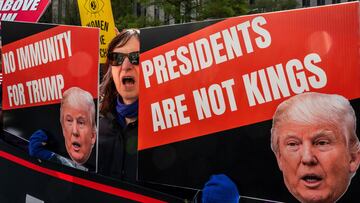POLITICS
Will Trump be able to pardon himself and his allies if he gets reelected?
Donald Trump is in court this week in a case with profound constitutional questions for US politics.

One of Donald Trump’s criminal trial’s is underway, surrounding an alleged hush money payment made to adult film actress Stephanie Clifford, professionally known as Stormy Daniels, on behalf of Donald Trump.
Should he be convicted, he would be the first US president convicted of a criminal charge. This has thrown up a number of constitutional queries, such as whether he would be able to run for president (he would) and if he could pardon himself once becoming president.
In the United States, there is no explicit prohibition in the Constitution regarding a president pardoning themselves. However, it’s a matter of considerable debate and legal interpretation. .
Regarding pardons for allies or associates, the president does have the authority to pardon individuals for federal crimes, including allies or associates. This power is quite broad and has been exercised by presidents throughout history, sometimes controversially.
Some presidential pardons from history
Perhaps the most famous presidential pardon is that of Richard Nixon by Gerald Ford in 1974. Nixon resigned from office in disgrace in the wake of the Watergate scandal, and Ford’s pardon was seen by many as a political move to prevent a lengthy and divisive national trial.
President Ford also pardoned boxer Muhammad Ali, who had been convicted of draft evasion during the Vietnam War. Ali’s conviction had been widely seen as unjust, and Ford’s pardon allowed him to resume his boxing career.
In 1900, President McKinley pardoned six Chinese diplomats who had been convicted of violating neutrality laws by supporting the Boxer Rebellion. This decision was made in order to improve relations between the United States and China.






